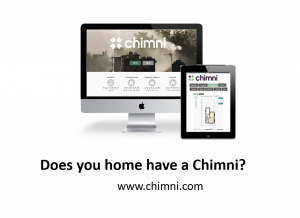You may have noticed Decipher people talking about our tech start up Chimni recently. Launching a consumer facing platform business is a significant departure for Decipher but we have wanted to trial some ideas created in our ‘skunk works’ and this is the first new business to launch out of that process.
We plan for Chimni to grow into the next type of home ‘platform’ helping homeowners make sense of the increasing number of online accounts and digital service providers they encounter.
 Using software and online services to run property is well established in the commercial world as modern office buildings have become ‘machine-like’ in their complexity. Commercial Facilities Managers now expect to use software and data analysis as a natural part of running run buildings. As our homes become more connected we can expect that behaviour to seep out of the commercial world and become normal in residential property.
Using software and online services to run property is well established in the commercial world as modern office buildings have become ‘machine-like’ in their complexity. Commercial Facilities Managers now expect to use software and data analysis as a natural part of running run buildings. As our homes become more connected we can expect that behaviour to seep out of the commercial world and become normal in residential property.
This is not to say that we are not already using more and more apps at home. To date, this has mainly been part of ‘Smart Home’ and ‘Internet of Things’ experimentation among early adopters. However the potential for software and digital services to support our home life and management of our properties is much greater. Around us, every organisation we encounter when running a home is going through its own digital revolution. From estate agents and utilities, through to local authorities, they all want a digital relationship with us and for us to use their web sites and apps as primary customer interaction.
Recently, in a consumer research session for Chimni, we encountered a man with 17 apps on his phone that somehow related to his home. These included multiple utility apps, local authority services, his insurance and mortgage company apps and apps for a host of smart devices. Having recently bought his house he also had estate agent, conveyancer and house move apps. He made the point in the research group that, as an early adopter of tech, he was willing to play around like this, but it wasn’t a long term solution to how he expected to manage his home.
We are in the early phases of these revolutions, so this kind of ‘app chaos’ is to be expected. But this can’t be the long term solution. After an initial explosion of apps and services, we can expect a period of rationalisation and tidy up. Chimni intend to part of this process and the Chimni team are already working with 500 trial users in West London and a group of local authorities to test integration.
 There are still some difficult issues to resolve around who owns the data produced in the new digital services around our homes. There is still an assumption among many service providers that this is their data. Services like Hive and Google Nest extract data from their connected devices and only make it available sparingly to householders. Very slowly regulation and legislation is giving power to individuals to control their personal data, but we have yet to see equivalent regulatory focus on the data produced by assets like our homes. This will have to change to support homeowners.
There are still some difficult issues to resolve around who owns the data produced in the new digital services around our homes. There is still an assumption among many service providers that this is their data. Services like Hive and Google Nest extract data from their connected devices and only make it available sparingly to householders. Very slowly regulation and legislation is giving power to individuals to control their personal data, but we have yet to see equivalent regulatory focus on the data produced by assets like our homes. This will have to change to support homeowners.
The core idea behind Chimni is that any data produced about our homes, for our homes or by our homes (in the case of IoT services & devices) should be the property of the householder not the service provider. Chimni is an attempt to give householders the tools to take control of that data and turn it into a valuable asset. We envisage a time when a homeowner will handover data logs and passwords in the way that we currently handover physical keys and alarm codes.
The final challenge is to establish the role of the home in the emerging vision for Smart and Connected Cities. Chimni believe that the home is the basic building block of the smart city (or at least the smart suburb) and as homeowners we should look to contribute data and insight into the wider city intelligence being created. So once we have established control of the data produced about, for and by our homes, we will be encouraged to share it, on our own terms, for mutual benefit. This will require our homes to connect intelligently to utilities and other networked services, and also to the systems that will need to be put in place by Local Authorities. However, councils are currently struggling with legacy IT systems and budget constraints, so the private sector is going to have to step in and support them.
Chimni is intending to provide the bridge between the intelligent home and the Smart City. Interaction between the home, local authorities and utilities will be a key element of the data services we are looking to provide.
